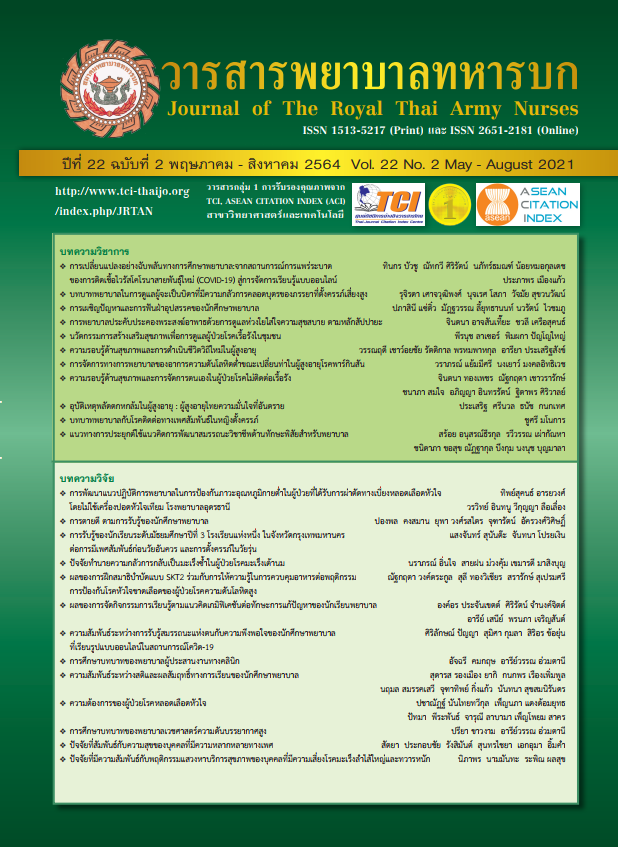Effects of Empowerment Programs on Knowledge in Glycemic Control, and Diabetes Prevention Behaviors of type II Pre-diabetes Person in Urban Area, Phayao Province
Keywords:
Empowerment program, Knowledge, Glycemic Control, Pre-diabetes Person, Type II Diabetes Mellitus Prevention Behaviors.Abstract
The quasi-experimental research design aimed to examine the effect of the empowerment program on knowledge and glycemic control of persons with pre-diabetes and preventive behaviors of on persons who risk type II diabetes mellitus in urban area, Phayao Province, applying Gibson conceptual framework consisting of this studied. The subjects were 20–59-year-olds with qualifications as specified. Data were collected between October and December 2019. The subjects were simple random sampling, equally to thirty persons in each group. The experimental group received nursing care by the empowerment program but control group receiving regular nursing care from the public health care teams. The research instrument consists of three parts: General data recording, Knowledge assessment questionnaires or diabetes control and diabetes prevention behaviors questionnaire, the Alpha Cronbach Coefficient of 0.89, data analyzed in general with descriptive statistics. Comparative analysis of knowledge scores about glycemic control and diabetes prevention behaviors within the groups before and after joining the empowerment program using dependent t test and analyzing between of variance in experimental and control groups using independent t test statistics.
The results showed that empowerment programs for type II diabetes mellitus prevention in the experimental group had higher scores than before the experiment, both within the group and between groups. Statistical had significant level .05. The finding reflects that teams, health care workers and those responsible for pre-diabetes person should continuing to apply empowerment concepts to improve the effectiveness of diabetes prevention in the community.
Downloads
References
Cho, NH., Shaw, JE., Karuranga, S., Huang, Y., Da-Rocha Fernandes, JD., Ohlrogge, AW, Malanda, B. IDF Diabetes Atlas: Global estimates of diabetes prevalence for 2017 and projections for 2045. Diabetes Research and Clinical Practice. 2018; 38: 271-81.
Nitiyanan, W. World Diabetes Day Thailand 2019 Together Fight Diabetes. Bangkok: Diabetes Association of Thailand under The Patronage of Her Royal Highness Princess Maha Chakri Sirindthorn; 2019. (in Thai).
Department of Disease Control. World Diabetes Campaign. Bangkok: Ministry of public Health; 2019. (in Thai).
Office of Disease Control 10, Chiang Mai Province. Chronic Non-communicable disease situation in 8 provinces in the upper northern region in 2015. Chiang Mai: Office of Disease Control; 2015. (in Thai).
Phayao Provincial Public Health Office. Reported the number of people with diabetes from screening (Excluding patients) in the suspected disease group. Phayao: Phayao Provincial Public Health Office; 2017. (in Thai).
Phayao Provincial Public Health Office. Report of the number of new cases of diabetes mellitus in Phayao province between January 1, 2017 and December 31, 2017. Phayao: Phayao Provincial Public Health Office; 2017. (in Thai).
American Diabetes Association. Prevention or Delay of type 2 Diabetes: Standard of Medical Care in Diabetes-2018. Diabetes Care. 2018; 41(1): s51-s6.
Diabetes Association of Thailand under the Royal Patronage of Her Royal Highness Princess Maha Chakri Sirindhorn Siam Boromrajakumari. Practice guidelines for diabetes 2017. Bangkok: Romyen Media Co., Ltd; 2018. (in Thai).
Jiraphongsuwan, A and Sawangphol, P.mFactors Associated with Self-Care Behavior of Diabetic Patients Ladlumkaew Hospital Lat Lum Kaeo District Pathum Thani Province. Journal of Public Health and Development. 2011; 9(2): 130-42. (in Thai).
Gibson, C.H. A Concept analysis of empowerment. Journal of Advance Nursing. 1971; 16: 354-61.
PhapornWiang, Y, Muenma, W, Srisuwannopkun, P, Kaewyongphang, W. Effects of Group Empowerment on Foot Care Behavior and quality of life in people with type 2 diabetes mellitus with foot ulcers. Journal of Nursing, Ministry of Public Health. 2012; 22(2): 85-97. (in Thai).
Chen, M.F., Wang, RH., Lin, KC. Hsu, HY., Chen, SW. Efficacy of an empowerment program for Taiwanese patients with type II diabetes: A randomized controlled trial. Applied Nursing Research. 2015; 28: 366-73.
Ucharattana, P., Pansakd, W. & Posre, C. The Effectiveness of the Empowerment Program on Development of Self-care Competency in Community Dwelling Elders. Journal of The Royal Thai Army Nurses. 2014; 15(2).: 216-24. (in Thai).
Polit, DF, Beck, CT. Nursing Research: Principles and Methods. 7th Edition, Lippincott Williams & Wilkins, Philadelphia; 2004.
Bloom, Benjamin S. Handbook on Formative and Summative Evaluation of Student Learning. New York: McGraw-Hill; 1971.
Kulnitichai, W. Predicting Factors for Prevention of Type 2 Diabetes in Type 2 Diabetes Group, Muang District, Phayao Province. Presented at a national convention. Chiang Mai: Payap University. 2017. (in Thai).
Rosjakphai, Y, Kittiruangkiet, S, Kamonmongkol, P. Effect of Empowerment Program on Self-Defense Behavior of Diabetes Risk Group. Nong Yai District Chonburi Province. Journal of Public Health Burapha University.2012; 7(2) :116-23. (in Thai).
Cheng, L., Sit, JWS., Choi, KC., Chair, SY., Li, X., Wu, Y., Long, J., Tao, M. Effectiveness of a patients-centred, empowerment–based intervention programmed among patients with poorly controlled type II diabetes: A randomized controlled trial. International Journal of Nursing Studies. 2018; 79: 43-51.
Downloads
Published
How to Cite
Issue
Section
License
บทความหรือข้อคิดเห็นใดใดที่ปรากฏในวารสารพยาบาลทหารบกเป็นวรรณกรรมของผู้เขียน ซึ่งบรรณาธิการหรือสมาคมพยาบาลทหารบก ไม่จำเป็นต้องเห็นด้วย
บทความที่ได้รับการตีพิมพ์เป็นลิขสิทธิ์ของวารสารพยาบาลทหารบก
The ideas and opinions expressed in the Journal of The Royal Thai Army Nurses are those of the authors and not necessarily those
of the editor or Royal Thai Army Nurses Association.






